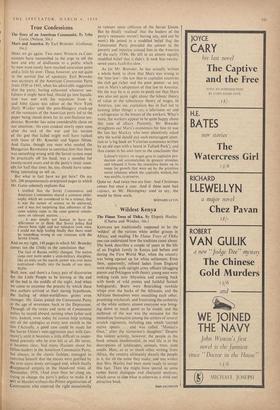True Confessions
HERE we go again. Two more Western ex-Com- munists have succumbed to the urge to tell the how and why of disillusion to a public which by now must surely have reached saturation point and a little bit over. These, however, are not quite in the normal line of apostates. Earl Browder was secretary of the American Communist Party from 1930 to 1945, when his admirable suggestion that the party, having exhausted whatever use- fulness it might have had, should go into liquida- tion was met with his expulsion from it; and John Gates was editor of the New York Daily Worker until the post-Hungary crack-up of the remnants of the American party led to the paper being closed down for its anti-Stalinist ten- dencies. Browder has some considerable claim on our attention : his eyes creaked slowly open soon after the end of the war and his version of the god that failed might well have ranked with those of Mr. Koestler and Signor Silone. And Gates. though any man who needed the Hungarian Revolution to convince him that there was something wrong with the Soviet system must be practically off his head, was a member for twenty-seven years and in the party's inner coun- cils for half that time; he, too, should have some- thing interesting to tell us.
But what in fact have we got here? On my left, 200 preposterously overpriced pages in which Mr. Gates solemnly explains that I testified that the Soviet Communists and American Communists shared a common philo- sophy which we considered to be a science, that it was the nature of science to be universal, and it was not surprising that adherents of the same science came to the same general conclu- sions on relevant matters. . . .
. . . it was simply not human to have no differences or to think that Soviet policy had always been right and not mistaken even once.
could not help feeling finally that there must be something wrong in our relations with the Soviet Union.
And on my right, 140 pages in Which Mr. Browder comes (on the 134th) to the conclusion that " The face of Russia svAftly changed. The nation came ever more under a semi-military discipline, like an army on the march, power was ever more centralised—finally into the hands of one man, Stalin.
Well, now, and there's a fancy pair of discoveries for the Little People to be leaving at the end of the bed in the middle of the night. And when we come to examine the process by which these two authors arrived at their daring hypotheses, the feeling of other-worldliness grows even stronger. Mr. Gates joined the Communist Party at the age of seventeen, back in the Depression. Through all the twists and turns of Communist Policy he stayed aboard, turning when father said turn. Indeed, even today he cannot help trotting out all the apologias at every new switch in the line ('Actually, a good case could be made for the Soviet Union's non-aggression pact with Ger- many'), until it becomes a little difficult to under- stand precisely why he ever left at all. He never, it becomes clear, had many illusions about his fellow-leaders in the American Communist Party, but always, in the classic fashion, managed to convince himself that the means were justified by the ever more dimly envisaged end, which finally disappeared entirely in the blOod-red mists of November, 1956. (And even then he' clung on, trying to change the party's policy to make it a sort of Hamlet-without-the-Prince organisation of Communists who reserved the right occasionally to venture some criticism of the Soviet Union. But he finally 'realised' that the leaders of the party's remnants weren't having any, and out he went.) He joined in a muddled belief that the Communist Party provided the answer to the poverty and injustice around him in the America of the early 1930s. He left in an almost equally muddled belief that it didn't. It took him twenty- seven years; I call this slow.
As for Mr. Browder, he has actually written a whole book to show that Marx was wrong in the 'iron law'—the law that in capitalist countries the rich get richer and the poor poorer—at any rate in Marx's adaptation of that law to America. On the way he is at pains to point out that Marx was also not quite right about the labour theory of value or the subsistence theory of wages. In America, you see, capitalism has in fact led to (among other things) a car, a television set and a refrigerator in the homes of the workers. What's more, the workers appear to be quite happy about this state of affairs. Patiently, Mr. Browder straightens out Marx's economics for him (it was the late Ian Mackay who once plaintively asked why the world should pay such extravagant atten- tion to 'a big book on Victorian economics written by an old man with a beard in Tufnell Park'), and thus comes in his own turn to the conclusion that Labour's victory on wages gave to capitalist pro- ductioh and accumulation its greatest stimulus, and released it from the restrictive limits on its room for growth that were set by the primitive social relations which the capitalist wished, but was unable, to preserve.
Quite so. And twice two are four. And Christmas comes but once a year. And if thine aunt had cojones, as Mr. Hemingway used to say, she would be thine uncle.
BERNARD LEVIN


































 Previous page
Previous page